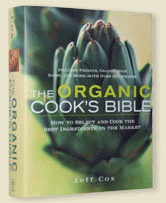Good Ideas Are a Dime a Dozen
Organic Lifestyle Comments Off on Good Ideas Are a Dime a Dozen
The President of a company where I once worked gave me a piece of wisdom that stuck with me.
“Good ideas are a dime a dozen,” he said. “What’s rare is someone who can take a good idea and realize it—make it into something worthwhile in the real world.”
Yeah. Good ideas are just “talk,” but doing something with them is “do.” In other words, you can talk the talk, but what counts is when you walk the walk.
That’s why I like Severine von Tscharner Fleming so much. Yes, she talks the talk about the need for young farmers, but then she walks the walk by being one herself. And a vigorous, energetic one at that.
She’s the director of The Greenhorns, a group of organic-minded young farmers and communicators in the Hudson Valley. Here’s how the organization defines its mission:
“The Greenhorns is a non-traditional grassroots non-profit organization made up of young farmers and a diversity of collaborators. Our mission is to recruit, promote and support the new generation of young farmers. We do this by producing avant-garde programming, video, audio, web content, publications, events, and art projects that increase the odds for success and enhance the profile and social lives of America’s young farmers.
“The news is in from urban, suburban and rural districts alike: America needs more young farmers and more young farmers want a piece of America. It will take millions of rough and ready protagonists of place to care for our ecosystems and serve our country healthy food in the years to come. The Greenhorns enable this critical meeting of minds, bodies, and land by helping young and aspiring farmers to navigate career paths, build skills, and connect with each other. Our multifaceted approach includes on-the-ground organizing of events and workshops, media production, and online coalition building.”
You can find out more by visiting www.thegreenhorns.net.
***
DROP A PILL INTO A GLASS OF WATER
TO SEE IF YOU’RE DRINKING PESTICIDES
It’s no secret that unwanted chemicals lurk in our food and drinks. But what if a little pill could warn us before we gulp down pesticide-laced water? Kristina Bravo of TakePart.com explains:
Researchers have been experimenting with an unlikely drugstore buy: dissolvable minty breath strips. A team from McMaster University in Canada discovered that pullulan, the same slimy fungus used to make the breath freshener strips, could also be used to make pills that contain pesticide-detecting enzymes. Just drop the pill in a glass of water, let it dissolve, and watch for any color changes.
“If the water doesn’t have any pesticides, [the water] actually forms a very strong blue. If it’s transparent at the end, it’s very contaminated,” said Carlos Felipe, the chemical engineering professor who led the study.
He said that testing water this way is a much cheaper alternative than other contamination screening processes. According to Felipe, producing 1,000 pills in one day would only cost a dollar. Countries such as India, where a large pesticide market compromises the water supply, could benefit from this quick and affordable technology.
Sana Jahanshahi-Anbuhi, the student who came up with the breath strip idea, will start a field test in Kerala, India, by the end of this year. The researchers are now looking into more applications. They said the pills could possibly contain vaccines, which otherwise need refrigeration, and E. coli–detecting molecules as well.
“We are currently working on detection of other contaminants [metals and E. coli] and starting on vaccine stabilization and delivery, which would have a tremendous impact for society,” Jahanshahi-Anbuhi said..
***
WHY IS THE FDA SO IGNORANT?
Perhaps you’ve heard that the FDA wants to ban wooden shelves for ripening cheese. Here’s a link to the story.
http://cheeseunderground.blogspot.fr/2014/06/game-changer-fda-rules-no-wooden-boards.html?m=1
And now for comment by our Frencyh correspondent: “There is nothing new in cheese production – some years ago a European directive instructed the producers of Reblochon to abandon their traditional pine shelves and move to plastic, which was perceived as being easier to sterilize.
Disastro! The cheese did not ripen; moreover, it spoiled. Back to the lab-–the bacteria in pine resin are antiseptic and prevent the wrong bacteria developing in the cheese. Now pines shelves are solidly reinstated.”
That’s in France. Here in America, the FDA has, in an ignorant fit of trying to be helpful, attacked a fundamental technique of cheesemaking. I’m betting the wooden boards will be kept, because “Blessed are the cheesemakers.”
***
CALIFORNIA’S COTTAGE FOOD ACT GETS IT RIGHT
As opposed to the FDA getting it exactly wrong on cheese boards, California gets it exactly right on allowing people to make food for sale from their home kitchens.
On September 21, 2012, Governor Jerry Brown signed the California Homemade Food Act into law. This law amends the California Health and Safety Code to create a new category of food facility operation, which unlike other food facilities, can be operated out of a home kitchen.
This new category, known as a Cottage Food Operation (CFO), will allow home kitchens to make and sell non-potentially hazardous foods. Non-potentially hazardous foods are foods that are unlikely to grow harmful bacteria or other toxic microorganisms at room temperature.
The California Department of Public Health has established a list of current approved foods that meet the definition as non-potentially hazardous. Additional foods may be added and removed through a 30-day process. The list of current approved foods includes the following:
• Baked goods without cream, custard or meat fillings
• Candy, including chocolate covered nuts and dried fruit
• Dried fruit and pasta
• Dry baking mixes, granolas, cereals, and trail mixes
• Fruit pies, fruit empanadas, and fruit tamales
• Honey, jams, jellies and fruit butters
• Nut mixes, nut butters and popcorn
• Vinegar and mustards
• Roasted coffee and dried tea
• Waffle cones and pizelles
CFOs are required to obtain an annual registration or annual permit to operate through Sonoma County Environmental Health and Safety. CFOs may sell directly and indirectly to the public, depending on their class of operation.
Class A CFOs may sell cottage foods directly from their homes, certified farmers’ markets, bake sales, and community events. Class A operations will be required to complete a self-certification process and obtain an annual registration from Sonoma County Environmental Health and Safety.
Class B CFOs will be required to obtain an annual permit from Sonoma County Environmental Health and Safety and will be inspected annually. In addition to direct sales from home, they are also permitted to sell cottage foods indirectly from local shops, restaurants and other third party sales.
For more information, visit
http://www.sonoma-county.org/health/services/foodcottage.asp
###












